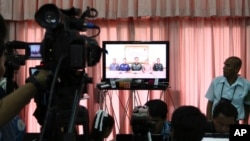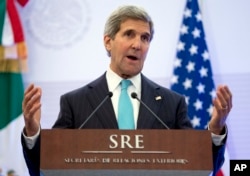World leaders expressed concerns about human rights and basic freedoms of the Thai people after the country’s military seized power in a coup on Thursday.
The U.S. expressed concern for Thailand's democratic institutions and called for restraint.
U.S. Secretary of State John Kerry said the Thai military’s actions on Thursday were cause for concern and he called for the immediate restoration of a civilian government.
“I am disappointed by the decision of the Thai military to suspend the constitution and take control of the government after a long period of political turmoil, and there is no justification for this military coup,” Kerry said in a statement.
He also voiced his concern over reports that senior political leaders of the country's major parties had been detained and called for their release.
In the statement, Kerry added, "I urge the restoration of civilian government immediately, a return to democracy, and respect for human rights and fundamental freedoms, such as press freedoms. The path forward for Thailand must include early elections that reflect the will of the people."
Kerry said the military coup has caused the U.S. to review military and other aid to Thailand.
“While we value our long friendship with the Thai people, this act will have negative implications for the U.S.-Thai relationship, especially for our relationship with the Thai military,” Kerry said. “We are reviewing our military and other assistance and engagements, consistent with U.S. law.”
Part of the military engagements include the U.S.-backed Carat naval drills in the Pacific that Thailand and several other countries are participating in.
Under U.S. law, with limited exceptions, no U.S. foreign aid may be directed to a country whose elected head of government is deposed by military coup or a coup in which the military takes a major role.
UN, France voice concerns
U.N. Secretary-General Ban Ki-moon is seriously concerned by the military takeover in Thailand, a statement from his office stated.
In a statement, the Secretary-General appealed "for a prompt return to constitutional, civilian and democratic rule, as well as all-inclusive dialogue that will pave the way for long-term peace and prosperity in Thailand."
The U.N. chief's statement also urged all parties to work together, refrain from violence and respect human rights.
Voicing deep concern, the United Nations human rights office said that martial law and military orders being imposed may infringe on fundamental freedoms, Reuters reported.
“We remind the authorities of Thailand's obligations under international human rights law in particular the International Covenant on Civil and Political Rights which strictly limit the application of emergency powers,” U.N. human rights spokeswoman Ravina Shamdasani said.
“We urge the authorities to take all necessary measures to ensure the fundamental human rights are respected,” she said.
Thailand's army chief Gen. Prayuth Chan-Ocha seized control of the government in a coup late Thursday afternoon, two days after he declared martial law, saying the military had to restore order and push through reforms to quell six months of turmoil and violence.
French President Francois Hollande condemned the army coup and called for an immediate return to the rule of law, the French news agency AFP reported.
Hollande called for "an immediate return to the constitutional order and for
a vote to be organized" as well as the need "for the fundamental rights and
freedoms of the Thai people to be respected."
British Foreign Secretary William Hague also urged Thailand to restore a democratically elected civilian government.
“I am extremely concerned by today's coup,” Hague said in a statement. “We look, therefore, to the authorities to set out a quick clear timetable for elections to help re-establish the democratic framework of governance.”
Return of power urged
Human Rights watch expressed alarm at what it called a “de facto coup.”
A statement released by the group said the military should return power to a civilian government immediately.
The International Federation of Journalists accused the military of crippling and trying to silence the media.
Thailand's army told all television and radio stations in the country to halt normal programs on Thursday, VOA's Bangkok correspondent reported.
Also, Thailand's currency sank Thursday after the country's military seized power, according to the AP.
Stock markets in Asia were boosted by signs of improvement in China's manufacturing while markets elsewhere drifted.
The Thai army chief's announcement of the coup came after the local stock market had ended its trading session. The Thai stock exchange said trading would open as usual on Friday.
Elsewhere, the markets were flat.
Some information for this report provided by Reuters, AP and AFP.
The U.S. expressed concern for Thailand's democratic institutions and called for restraint.
U.S. Secretary of State John Kerry said the Thai military’s actions on Thursday were cause for concern and he called for the immediate restoration of a civilian government.
“I am disappointed by the decision of the Thai military to suspend the constitution and take control of the government after a long period of political turmoil, and there is no justification for this military coup,” Kerry said in a statement.
He also voiced his concern over reports that senior political leaders of the country's major parties had been detained and called for their release.
In the statement, Kerry added, "I urge the restoration of civilian government immediately, a return to democracy, and respect for human rights and fundamental freedoms, such as press freedoms. The path forward for Thailand must include early elections that reflect the will of the people."
Kerry said the military coup has caused the U.S. to review military and other aid to Thailand.
“While we value our long friendship with the Thai people, this act will have negative implications for the U.S.-Thai relationship, especially for our relationship with the Thai military,” Kerry said. “We are reviewing our military and other assistance and engagements, consistent with U.S. law.”
Part of the military engagements include the U.S.-backed Carat naval drills in the Pacific that Thailand and several other countries are participating in.
Under U.S. law, with limited exceptions, no U.S. foreign aid may be directed to a country whose elected head of government is deposed by military coup or a coup in which the military takes a major role.
UN, France voice concerns
U.N. Secretary-General Ban Ki-moon is seriously concerned by the military takeover in Thailand, a statement from his office stated.
In a statement, the Secretary-General appealed "for a prompt return to constitutional, civilian and democratic rule, as well as all-inclusive dialogue that will pave the way for long-term peace and prosperity in Thailand."
The U.N. chief's statement also urged all parties to work together, refrain from violence and respect human rights.
Voicing deep concern, the United Nations human rights office said that martial law and military orders being imposed may infringe on fundamental freedoms, Reuters reported.
“We remind the authorities of Thailand's obligations under international human rights law in particular the International Covenant on Civil and Political Rights which strictly limit the application of emergency powers,” U.N. human rights spokeswoman Ravina Shamdasani said.
“We urge the authorities to take all necessary measures to ensure the fundamental human rights are respected,” she said.
Thailand's army chief Gen. Prayuth Chan-Ocha seized control of the government in a coup late Thursday afternoon, two days after he declared martial law, saying the military had to restore order and push through reforms to quell six months of turmoil and violence.
French President Francois Hollande condemned the army coup and called for an immediate return to the rule of law, the French news agency AFP reported.
Hollande called for "an immediate return to the constitutional order and for
a vote to be organized" as well as the need "for the fundamental rights and
freedoms of the Thai people to be respected."
British Foreign Secretary William Hague also urged Thailand to restore a democratically elected civilian government.
“I am extremely concerned by today's coup,” Hague said in a statement. “We look, therefore, to the authorities to set out a quick clear timetable for elections to help re-establish the democratic framework of governance.”
Return of power urged
Human Rights watch expressed alarm at what it called a “de facto coup.”
A statement released by the group said the military should return power to a civilian government immediately.
The International Federation of Journalists accused the military of crippling and trying to silence the media.
Thailand's army told all television and radio stations in the country to halt normal programs on Thursday, VOA's Bangkok correspondent reported.
Also, Thailand's currency sank Thursday after the country's military seized power, according to the AP.
Stock markets in Asia were boosted by signs of improvement in China's manufacturing while markets elsewhere drifted.
The Thai army chief's announcement of the coup came after the local stock market had ended its trading session. The Thai stock exchange said trading would open as usual on Friday.
Elsewhere, the markets were flat.
Some information for this report provided by Reuters, AP and AFP.






